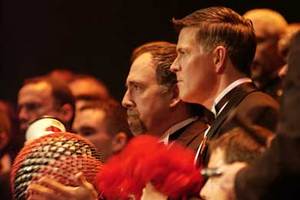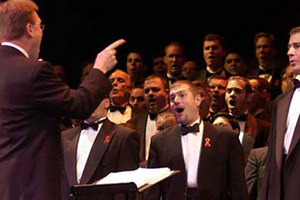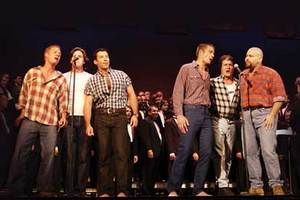Steve Smith hopes to achieve equal rights for GLBT people through music
By Alexandra Cavallo
5/3/10
Steve Smith is
the executive director for the Boston Gay Men's Chorus, a non-profit
organization that has been an active part of the gay choral movement since the
early 1980s.
The gay choral
movement began in the 1970's, in cities like San Francisco and New York, as
part of the gay liberation movement. The San Francisco chorus, which was one of
the largest at the time, sang at the Boston Opera House in 1981, effectively
inspiring gay men in Boston to start a chorus of their own.

"As I'm told,"
Smith said, "even on the street after the concert, people were talking to each
other and said 'we should start something like that here.' And so the chorus, in fact, was very
grassroots. People sort of put up posters and sometime in 1982 they started
singing together informally."
Smith said that
in its first year the chorus had around 30 members. Now, the chorus boasts
approximately 150 active singers. The chorus holds formal auditions twice a
year, auditioning around 40 people of which they accept about 80 percent. Smith
explained that members don't have to read music fluently to be considered,
though it is difficult to be successful in the chorus without fundamental sense
of how to read music. Most of their members have some sort of musical
background, whether it is experience in a high school or church choir or
professional training.
Smith said that
the chorus is dedicated to singing a diverse mix of music, from a variety of
genres, from pop to jazz to classical compositions.
"The next concert
we have coming up is called "Divas" and it really could not be more
stereotypical," he laughed. "It's Judy Garland, Liza Minnelli, Beyonce, Barbra...it's
sort of all the divas that gay men sort of traditionally like."
However, the
chorus also takes the opportunity to sing about serious social issues. The BGMC
recently performed a piece of music commissioned especially for the chorus about
marriage equality, an issue that is close to many of the members' hearts.
"Ever since the
chorus was founded outreach has been a huge part because the whole reason we
wanted to be an openly gay chorus is to help people and make people comfortable
with gay and lesbian issues," Smith explained. "Now, with gay rights so much more accepted, at least here in
our area, it's about continuing that and sort of delving into the finer
points."

One of those
finer points, Smith noted, is reaching out to young people. The BGMC performs
three or four concerts in Massachusetts high schools each year. Smith said that
they are always pleasantly surprised, and encouraged, by how receptive their
audiences are.
"It's been
great," he said. "The classic story, is that the first time we did it, we went
into Belmont High School, and the guys in the chorus were scared to death
because so many of us had our own baggage from high school experiences. And it
turns out we were all much more uptight about it than anyone at the school
was!"
Smith said that
each time they sing at a school, and are welcomed, it is a very positive and
powerful experience. He hopes that the feeling is mutual.
"For us to be
there as sort of adult examples of the ability to live a rewarding and fun an
successful life as an openly gay man," Smith said, "both gives gay and lesbian
students a sense of their own potential and shows gay and straight students
alike that, you know, we're just people."
Smith said that,
personally, as a gay high school student in the 80's, he had a pretty rough
time of it. Entering these high schools as fully formed adult gay man, he now
sees some real positive changes in students' perceptions of what it means to be
gay. However, he said, he is not naïve enough to believe that young GLBT
people's experiences are rosy across the board.
"I think it [students'
reactions to homosexuality] reflects a level of comfort and sophistication with
gay and lesbian people," he said. "I think that there's less chance you've had
positive interactions with gay people if it's more rural and you know less in
the mainstream." The BGMC's high school outreach program seeks to close that
gap, song by song.
The BGMC have
also had the opportunity to spread their message through song at various open
and affirming places of worship in Boston.
"That was very
groundbreaking work, when a lot of churches went through the process," Smith
remembered. "So it was a very big deal for them, when they were going through
that process, to invite us in. It's been a way for us to help people in the
congregation bridge their disagreements or their discomfort and, again, see us
as people and hear our issues."
Smith went on to
say that, for many of the gay men he knows, religion is one of the biggest
sources of conflict and pain in their lives. However, despite the struggle, it
is still something a lot of them want in their lives.
"You know, my own
partner is Catholic, and has a lot of struggle with wanting to honor and be
part of the faith that he grown up in and also not feeling accepted in it,"
Smith shared. For this reason, it is especially fulfilling when the chorus is
invited to sing at a church or synagogue.
Another outlet
for social activism that is important to the BGMC, in keeping with their recent
performance focused on marriage equality, is the part they've played in many of
the first same-sex unions in Boston.

Smith and the
chorus sang at the first gay church wedding in Massachusetts. When the court
finally ruled that same-sex couples could get married, many couples went to
city halls and got married at midnight. The first union performed in a church
by a minister, however, was at 10am at Arlington Street Church, where the
chorus first rehearsed in it's history. The couple, David Wilson and Rob
Compton, are longtime attendees of the chorus and one of the seven plaintiff
couples that won the court ruling. They invited the BGMC to participate in
their wedding.
"So we came and
we sang and we cried," remembered Smith. "Every TV station and news outlet was there. It was very
emotional and a very big deal"
Smith believes
that the work he and his chorus does is incredible important. He recalled a
European tour that the BGMC embarked on in 2005, when the chorus sang at
various venues across Germany, Poland and the Czech Republic. The chorus hit
Berlin for the gay pride weekend, called the Christopher Street Parade. Smith
said that the turn out was incredibly overwhelming....and inspiring. The chorus
had the opportunity to sing for 500,000 people, whose support and joy was
contagious.
However,
following their warm reception in Germany, Smith and the chorus arrived in
Poland, a country that Smith said is much more conservative than Germany.
"We were the
first openly gay chorus to ever go to Poland. And we knew that it would be
somewhat controversial," he said. "But I think we underestimated just what that
would be like."
Smith said that
they were met met with protesters, whose vehemence was such that the chorus was
forced to be under 24-7 police guard. While they were there, a right wing group
rallied to have their concert cancelled.
"It was a very
intense couple of days," Smith said, shaking his head.
However, he
asserted, the resistance with which they were met only served to make the
efforts of those who came and supported their chorus ever more touching.
"It took a great
deal of bravery for people to go to the concert because, again, it's very
unusual for people to be openly gay in Poland.," Smith said. "Because of the
media attention we attracted, just going to the concert sort of outed you or
had that potential. So we were really moved by the people that came to the
concert and by how much it meant to them. It really reinforced for us how
powerful singing can be."
It is this
potential to touch and move people through song that powers Smith and the
chorus forward, along with a devotion to music.
"It's a trite
phrase," Smith said, with a laugh. "But music is the universal language."
For more information about the Boston Gay Men's Chorus visit their website:
bgmc.org
To hear samples of their music, click below!
LISTEN



